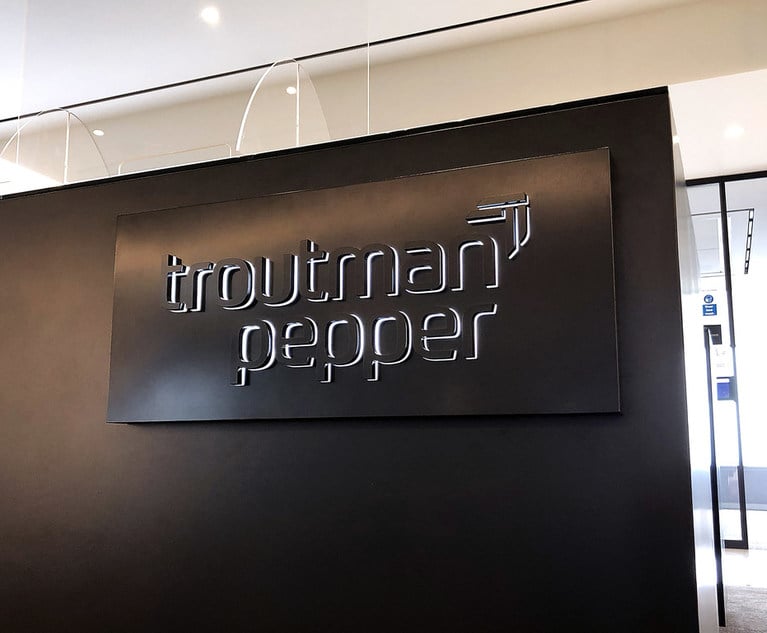Risperdal Plaintiffs Ask Pa. Supreme Court to Toll Statute of Limitations
Two men who started taking the antipsychotic drug Risperdal in the 1990s had no way of suspecting its link to excessive breast tissue growth they experienced—until their mothers saw TV commercials discussing the link more than a decade later—attorneys have argued to the Pennsylvania Supreme Court in an effort to expand the statute of limitations for bringing lawsuits over the drug.
November 02, 2018 at 02:56 PM
3 minute read
 Photo: JB Reed/Bloomberg
Photo: JB Reed/Bloomberg
Two men who started taking the antipsychotic drug Risperdal in the 1990s had no way of suspecting its link to excessive breast tissue growth they experienced—until their mothers saw TV commercials discussing the link more than a decade later—attorneys have argued to the Pennsylvania Supreme Court in an effort to expand the statute of limitations for bringing lawsuits over the drug.
Attorneys for plaintiffs Jonathan Saksek and Joshua Winter filed a brief to the Pennsylvania Supreme Court on Wednesday asking the justices to overrule a Superior Court decision that said plaintiffs should have been aware of the connection by 2006.
According to attorneys involved in the litigation, the issues raised in the cases Saksek v. Janssen and Winter v. Janssen affect more than 40 percent of the roughly 6,700-strong Risperdal docket, which has seen dramatic growth over the past few years.
The plaintiffs, both of whom sued drugmaker Janssen Pharmaceuticals in 2014 after their mothers saw a TV commercial linking Risperdal to excess growth of breast tissue, asked the justices to remand the cases back to the Philadelphia Court of Common Pleas for further proceedings.
Both of the cases had been dismissed on summary judgment after Philadelphia Court of Common Pleas Judge Arnold New, who oversees the city's Complex Litigation Center, determined that, based on the medical literature, newspaper articles and attorney advertisements, their claims began to run no later than August 2009. The Superior Court affirmed that ruling, and further determined that their claims began to accrue even earlier, saying the plaintiffs should have known about their injuries by the time that Janssen decided to change Risperdal's label in 2006.
In July, the justices agreed to take up the statute of limitations issue.
The brief, which was filed by Kline & Specter attorneys Thomas Kline and Charles “Chip” Becker, noted that the plaintiffs grew the breast tissue while they were in puberty, making it difficult for the boys to notice any link between the breast growth and the drug, rather than the common weight gain that can occur during puberty. The brief also argued that neither boy was taking the drug by 2004, so they would not have been aware of the 2006 label change.
“The October 2006 inset may have sufficed to put somebody on notice of the Risperdal-gynecomastia connection so as to cause that individual's Risperdal claims against Janssen to accrue by that date. But nothing in this record suggests that the label change sufficed to place Jonathan or Joshua on notice as a matter of law,” the brief said. “Janssen has a classic jury argument. The court should require Janssen to make that argument to a jury, and allow jurors to decide its persuasiveness.”
In an emailed statement, Kline and Becker said they were pleased the justices had agreed to take up the case.
“Judge New's decision, affirmed in non-precedential fashion by the Superior Court, time-bars plaintiffs from bringing claims concerning permanent injuries that the plaintiffs did not know they had suffered and had no reason to relate to their ingestion of Risperdal,” they said in the statement. “We are hopeful that the court will reinstate the legal rights of thousands of valid Risperdal claims.”
A spokeswoman for Janssen said the company declined to comment on the brief, but added “we will continue to defend the claims in this litigation.”
This content has been archived. It is available through our partners, LexisNexis® and Bloomberg Law.
To view this content, please continue to their sites.
Not a Lexis Subscriber?
Subscribe Now
Not a Bloomberg Law Subscriber?
Subscribe Now
NOT FOR REPRINT
© 2025 ALM Global, LLC, All Rights Reserved. Request academic re-use from www.copyright.com. All other uses, submit a request to [email protected]. For more information visit Asset & Logo Licensing.
You Might Like
View All

Troutman Pepper Says Ex-Associate Who Alleged Racial Discrimination Lost Job Because of Failure to Improve
6 minute read
Over 700 Residents Near 2023 Derailment Sue Norfolk for More Damages
3 minute readTrending Stories
- 1Eight Years On, A&O Shearman’s Fuse Legal Tech Incubator is Still Evolving
- 2Google Makes Appeal to Overturn Jury Verdict Branding the Play Store as an Illegal Monopoly
- 3First Amendment Litigator Returns to Gibson Dunn
- 4In Record Year for Baker Botts, Revenue Up 11.8%, PEP Up 17.6%
- 5Loopholes, DNA Collection and Tech: Does Your Consent as a User of a Genealogy Website Override Another Person’s Fourth Amendment Right?
Who Got The Work
J. Brugh Lower of Gibbons has entered an appearance for industrial equipment supplier Devco Corporation in a pending trademark infringement lawsuit. The suit, accusing the defendant of selling knock-off Graco products, was filed Dec. 18 in New Jersey District Court by Rivkin Radler on behalf of Graco Inc. and Graco Minnesota. The case, assigned to U.S. District Judge Zahid N. Quraishi, is 3:24-cv-11294, Graco Inc. et al v. Devco Corporation.
Who Got The Work
Rebecca Maller-Stein and Kent A. Yalowitz of Arnold & Porter Kaye Scholer have entered their appearances for Hanaco Venture Capital and its executives, Lior Prosor and David Frankel, in a pending securities lawsuit. The action, filed on Dec. 24 in New York Southern District Court by Zell, Aron & Co. on behalf of Goldeneye Advisors, accuses the defendants of negligently and fraudulently managing the plaintiff's $1 million investment. The case, assigned to U.S. District Judge Vernon S. Broderick, is 1:24-cv-09918, Goldeneye Advisors, LLC v. Hanaco Venture Capital, Ltd. et al.
Who Got The Work
Attorneys from A&O Shearman has stepped in as defense counsel for Toronto-Dominion Bank and other defendants in a pending securities class action. The suit, filed Dec. 11 in New York Southern District Court by Bleichmar Fonti & Auld, accuses the defendants of concealing the bank's 'pervasive' deficiencies in regards to its compliance with the Bank Secrecy Act and the quality of its anti-money laundering controls. The case, assigned to U.S. District Judge Arun Subramanian, is 1:24-cv-09445, Gonzalez v. The Toronto-Dominion Bank et al.
Who Got The Work
Crown Castle International, a Pennsylvania company providing shared communications infrastructure, has turned to Luke D. Wolf of Gordon Rees Scully Mansukhani to fend off a pending breach-of-contract lawsuit. The court action, filed Nov. 25 in Michigan Eastern District Court by Hooper Hathaway PC on behalf of The Town Residences LLC, accuses Crown Castle of failing to transfer approximately $30,000 in utility payments from T-Mobile in breach of a roof-top lease and assignment agreement. The case, assigned to U.S. District Judge Susan K. Declercq, is 2:24-cv-13131, The Town Residences LLC v. T-Mobile US, Inc. et al.
Who Got The Work
Wilfred P. Coronato and Daniel M. Schwartz of McCarter & English have stepped in as defense counsel to Electrolux Home Products Inc. in a pending product liability lawsuit. The court action, filed Nov. 26 in New York Eastern District Court by Poulos Lopiccolo PC and Nagel Rice LLP on behalf of David Stern, alleges that the defendant's refrigerators’ drawers and shelving repeatedly break and fall apart within months after purchase. The case, assigned to U.S. District Judge Joan M. Azrack, is 2:24-cv-08204, Stern v. Electrolux Home Products, Inc.
Featured Firms
Law Offices of Gary Martin Hays & Associates, P.C.
(470) 294-1674
Law Offices of Mark E. Salomone
(857) 444-6468
Smith & Hassler
(713) 739-1250






